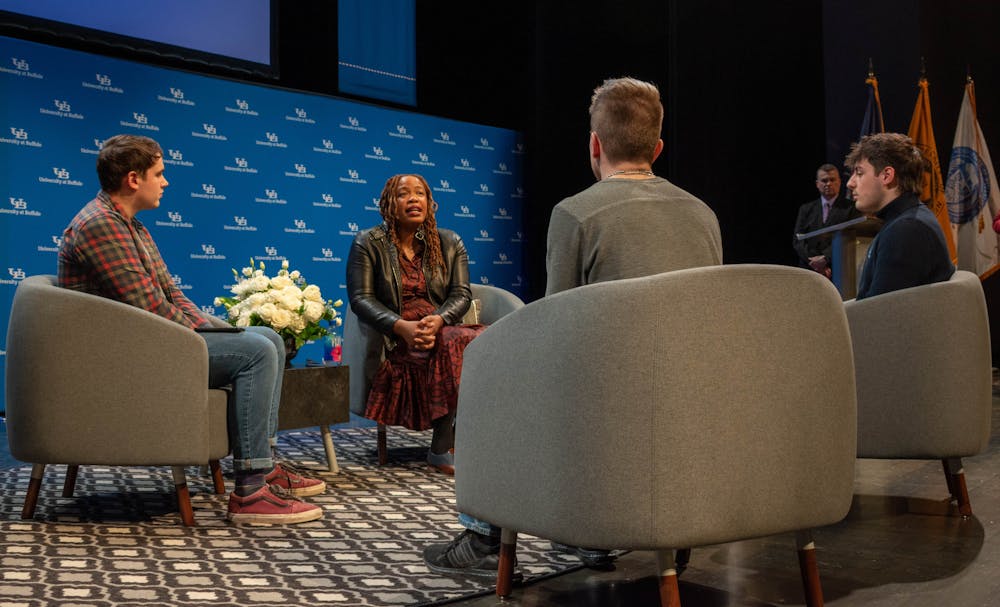As the head of the think tank Demos, Heather McGhee oversaw an organization that gathered data on the problems facing America’s working and middle classes, crafted public policies designed to fix those problems, and advocated for them on Capitol Hill and in the press.
But she didn’t think it was enough.
In 2018, she quit her job to address head-on what she called “drained-pool politics.” In 2021, she published “The Sum of Us: What Racism Costs Everyone and How We Can Prosper Together,” which debuted at No. 3 on the New York Times best seller list.
McGhee sat down with The Spectrum before her appearance as part of the 37th Distinguished Speaker Series to talk about how racism destroys public goods, why voting in 2024 is like picking a bus route, and why she’s optimistic about the future of multiracial democracy:
This interview has been edited for length and clarity.
The Spectrum: In your book, you have this example of a local government filling in a municipal pool once it was forced to integrate. So we were curious, how far back does racism’s effect on public policy go? What’s the earliest example you’ve seen of something like that?
Heather McGhee: That’s a good question. I think the story of the drained pool is specifically a story of racism’s impact on public goods — not just public policy, like laws and regulations and rules, but on literal public infrastructure. And what’s so interesting is that there was this white, avowed racist named Hinton Rowan Helper, who, on the eve of the Civil War, cataloged how the South had many fewer public goods — that everybody could enjoy — than the North. And he really attributed that discrepancy to the fact that the plantation class didn’t care to build up the South because they didn’t need great roads and bridges and schools and streetlights and libraries and things like that because they had this captive labor force. They didn’t want an educated population. And so Hinton Rowan Helper was actually saying that slavery is bad for most white people in the South, that it’s making our community poor because of the massive inequality that the plantation class enjoys. So I think that’s a very early instance of racism’s impact on public goods. Racism’s impact on public policy is as evident as our first public policies, really: our first laws to create chattel slavery, our first laws to dispossess Indigenous people of their land. The list goes on and on.
TS: Your book starts with the anecdote about progressive economists who believe that framing a policy as a benefit to people of color would hurt their position. How do you think universities can prepare students to challenge these ideas or to choose policy narratives that may not be politically beneficial, but are the right thing to do?
HM: That’s a great question. I do think there is an advantage and a reason to frame things in a way that’ll bring more people in. I actually think it is important to be effective, in addition to being right. And people can’t wait for the absolute perfect, truest, most righteous framing or the perfect truest, most righteous law. We need to make progress now. In some ways, politics is like a bus: you get on the bus that takes you closest to your destination, not necessarily the one that lets you off exactly at your house. There is a practicality that is needed in order to make progress. That said, I do think that the art of persuasion and the craft of persuasion in organizing is something that absolutely needs to be taught in schools and, frankly, isn’t taught enough. So many young people want to be activists, are activists on campus and before college, and yet they don’t sit in the class and learn how to organize, how to door knock, how to persuade, how to do a power analysis of the stakeholders and the decision-makers. And that’s really important stuff. I can understand why administration’s may not want to teach their students how to organize against them. But for our democracy, it’s a very important set of skills.
TS: You’ve said before that you’re more interested in stopping the people who are selling racist ideas than you are in stopping the people who are desperate enough to buy them. Can you tell me a little bit about why that distinction matters?
HM: I think that distinction matters because of persuasion, right? Because if you write off all the people who are consuming racist stories, then you’ve lost a customer for your own story, right? I also think it’s just smart strategy to go to the source as opposed to trying to play whack-a-mole with all the different people who are being manipulated and who are buying propaganda and disinformation.
TS: You write in your book that “the logic that launched the zero-sum paradigm — I will profit at your expense — is no longer sparing millions of white Americans from the degradations of American economic life as people of color have always known it.” Why are most white Americans no longer benefiting from that paradigm?
HM: That’s a really good question. I haven’t read that line in a while, so I was like, “Oh, I wrote that? That’s interesting. I believe that.” The central metaphor at the heart of “The Sum of Us” is the story of the drained pool, and I use that to describe what life was like in an era when an entirely white power structure made decisions that meant an ever-increasing quality of life for white people. And the image of a grand resort style public swimming pool that’s free — it’s sort of visceral, right? That sounds really, really nice, and we know that we don’t have that. Those of us who were born after that era of big public works and the American dream, picket fence kind of lifestyle that went with it. And the inequality era, that replaced the era of public goods, has been one in which a narrow, self-interested elite has really rigged the rules to make it harder for most Americans to have a high quality of life. And that includes white people. Now, there are still massive disparities, right? If your parents and grandparents were part of the generation that got to enjoy the “public pool,” then they were able to pass things down to you, and that means that you’re a little more protected from this economy that is so much more brutal, and where people don’t have job security, and where you have to pay the high cost of tuition, and where healthcare is out of reach, and where both parents have to work, and you don’t have subsidized child care, and all of these things that add up to a lot of economic pressures. Yes, being white and being descended from people who had a lot of government-subsidized wealth-building in that earlier era is an advantage, but it’s still a very precarious economy. And particularly young people know that there are no guarantees anymore. And I think it’s an opportunity to create a lot of cross-racial organizing around economic issues that could benefit all of us.
TS: Why are you optimistic about the future of racial equity?
HM: I’m optimistic about the future of racial equity because of what we’re seeing now, in terms of the bare-knuckled, breathtakingly aggressive assault against the right to speak freely about racial justice. The fact that there is an anti diversity movement now, it actually makes me optimistic because it shows how threatened the ruling class is by the consciousness raising that has happened. If they weren’t so threatened, they wouldn’t be banning books. They wouldn’t be trying to make it hard for very basic concepts and history to be taught. And it’s a massive overreach. It’s not popular with nine out of ten Americans, this anti-diversity onslaught from higher education admissions to banning books and trying to make a boogeyman out of diversity, equity and inclusion. It’s an overreach that shows how scared they are.
TS: So obviously we have a presidential election in 2024. What is at stake for race relations in that election?
HM: Nothing really — I’m just kidding. I mean, that’s such a big question. The analogy I made about the bus is really relevant here, right? I don’t think that either of the likely nominees is the bus that’s going to take me exactly to the house of the promised land, right? And yet, there’s some political coalitions that will make progress and there’s some coalitions that’ll turn the bus around. So many of the freedoms that are on the ballot — whether they are reproductive freedoms, the freedom to learn, the freedom to live, all across the board — are ones that have racial justice implications. And to be blunt, we have one choice that the country could make where racist rhetoric is a core part of the story. We have the loudest, most committed proponent of the zero-sum lie at the top of the ticket. That’s a very powerful perch to keep selling the racist ideas from, and it’s very dangerous if this country says to the world that that’s the direction we want to keep going. And it’s very dangerous to continue to give that zero-sum lie such a big platform. So it couldn’t be more dangerous for multiracial democracy to have a pretty white nationalist view of society be ascendant yet again.
Dominick Matarese is the senior features editor and can be reached at dominick.matarese@ubspectrum.com
Grant Ashley is the editor in chief and can be reached at grant.ashley@ubspectrum.com

Dominick Matarese is the Senior Features Editor at the Spectrum. He enjoys writing about interesting people, places, and things. In addition to running an independent blog, he has worked worked with the Owego Pennysaver, BROOME Magazine, the Fulcrum Newspaper, and Festisia. He is passionate about music journalism and can be found enjoying live music most weekends.

Grant Ashley is the editor in chief of The Spectrum. He's also reported for NPR, WBFO, WIVB and The Buffalo News. He enjoys taking long bike rides, baking with his parents’ ingredients and recreating Bob Ross paintings in crayon. He can be found on the platform formerly known as Twitter at @Grantrashley.





